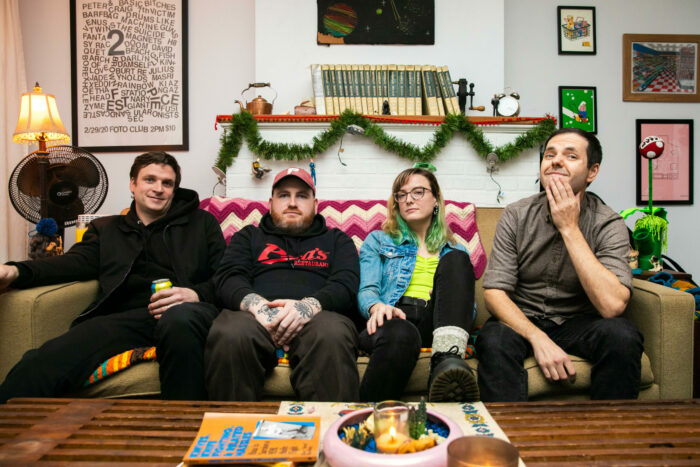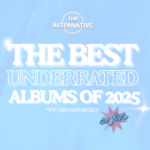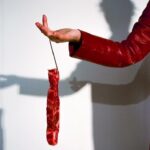Interview: Big Nothing
Posted: by The Alt Editing Staff

Big Nothing’s roots are strong and deep. Even if they wanted to, the quartet of Pennsylvanians wouldn’t be able to shake the amorphous web of friend, work, and music relationships they’ve formed throughout their time in Philly. Matt Quinn (guitarist/vocalist) and Pat Graham’s (guitarist) MySpace bands “played together twice.” Liz Parsons (bassist/vocalist) knew Matt from work, and Pat has toured with Lame-O Records founder, Eric Osman. Chris Jordan (drummer) jumped into the mix, you get the picture.
Following 2019’s anthemic full-length debut Chris, circumstance had conflicting plans for the group. As they began to make inroads into the revered hotbed of artists and labels that is Philadelphia’s independent music scene—people Big Nothing see as friends above all else—COVID nixed their regular practice sessions and post-jam dinners, constraining their creative pursuits to solo apartment recordings and email chains. Without beer and a room full of pals (maybe only the latter), Big Nothing have inched away from the soaring power pop of Chris, towards a brand of alt-country-tinged guitar pop that would still make Paul Westerberg proud, all while remaining as charming and convivial as ever. Dog Hours is the phoenix rising from the shit show, and its softer melodies sincerely commemorate the buzzed times before it all.
I caught up with Liz, Matt, Pat, and Chris after band practice. With pizza slices in hand, they cracked jokes and spoke humbly of the Philadelphia scene they’re psyched to be a part of (it’s not just the rent). The choice decor of the hourly practice space they beamed in from made for an apt, albeit entirely coincidental aesthetic representation of Dog Hours. As an “American Original” Johnny Cash poster hugged the wall, we talked about Lame-O Records, Philadelphia, The Replacements, and Jackass Forever. Rock, flag, and eagle, baby!
The Alternative: So when did Lame-O come knocking?
Matt: I think we came knocking.
Pat: We’ve all known Eric [Osman, founder of Lame-O Records and manager of Philly emo greats, Modern Baseball] and Emily [Hakes, co-head of the label and publicist] for a long time. And I’ve known Eric, like I’ve toured with him, so I’ve pestered him a lot about putting records out. And he was always like, “I don’t know, maybe.” This one just kind of clicked. I pester him pretty much every time we make a record. Usually, he’s just like, “whatever,” but this time he said yes! And yeah, that was kind of it. Eric and Emily have both been our friends, I love Lame-O, and I think we all are stoked on what they do with Philly.
Matt: Good chance they might not even like the record or might not even have listened.
Pat: The day we announced our first single they followed us on Twitter. And I was like, “um, you guys?” But they’re old friends. We love them. He’s just sorry he’s such a friend that it was just like, I sent it to him and said “it’s a pandemic, I don’t know how to put this out.” And he was like, “okay.”
Around that time, what did live shows look like? Were there any staple venues in the city that really helped y’all? What did Philly do for y’all?
Pat: What can Philly do for you? As far as staple venues, I do wanna shout-out Boot & Saddle. Because that’s somewhere that, as a band…
Matt: The only place we’ve ever sounded good.
Pat: It’s just a really nice place that we lost to the pandemic, so that place was definitely somewhere that I think we played some of our best shows and we met a lot of people. And Everybody Hits of course is always a good place. That’s a bummer, but that was pre-pandemic that that left. But yeah, live music in Philly now really isn’t anything. It’s like bigger bands coming through and playing Union Transfer.
Liz: Over the summer there were some shows, like smaller shows, but everything stopped again.
Pat: We’ve played one show since the pandemic. We are not well versed in that world. That was a lot of the conversation with Eric and Emily. It was basically us being like, “what do we do?” We wrote a bunch of songs we like, we’re probably not gonna tour, what do we do? It’s just kind of been like reinventing… shit. But Philly is always the best. There’s a lot of new venues like Photo Club. There’s always cool venues. Philly is very important to us.
Speaking to the stereotypes of local booking, did y’all have any shitty experiences with pay-to-play or promoters when you were first coming up and playing shows?
Pat: No, actually, we’ve all been in bands around the Philly area for a long time, so we’ve kinda had a built-in community already.
Chris: We’re also all old and jaded and we won’t enter a contest or pay for tickets.
Matt: I would!
Pat: No, we would. I think we would to be funny.
Chris: If it’s like whoever makes the best statue of a dog out of Play-Doh, then we would. But no, I guess that is the good thing about Philly, if we wanna be specific about how it feels to be a band here and stuff, is it’s all friends. Everybody knows each other, so it doesn’t feel like a competition among bands and venues. It’s just, someone texts you and says “hey wanna play this show?” And if we’re not too tired that weekend, then yeah!
Pat: It’s a funny/happy problem too. We hadn’t done much of the band in like two years, so then the day we released our first single, I got like four texts like “yo, I have a show in April, can you guys open this show??” There’s always shows going on, and everyone’s excited about new bands, even if it’s like, “I didn’t listen to you ever, but please play this show!”
What was it like working with Ian Farmer at The Metal Shop? Obviously those guys are local legends. Everyone in the Modern Baseball-Slaughter Beach, Dog Cinematic Universe.
Liz: We’re friends with Ian, Zack [Robbins]—we’re friends with a lot of those guys—so it was very easy and natural. I think ideally, we wanted to go away for a week and record an album, but that wasn’t really available. Nobody had been vaccinated or anything. It was very cool that [Ian] was able to coordinate and had time for us and everything. We did it over the course of, like what, a couple weeks?
Pat: No, it honestly took months! We did the bass and drums with Ian in November, and then COVID got really bad in November and December of 2020.
Matt: So yeah, we did drums and bass, and then we were gonna record the rest ourselves via, like, Garageband. And we started to. Pat and I started recording guitar and sending them back and forth, and they didn’t sound good.
Pat: We’re not good at it.
Matt: Then we went back to Ian’s in March [2021], I think. And then it didn’t get mixed until August or something.
Pat: There were just a lot of delays with everything, but to your specific question, like those dudes are just all of our friends. Like Philly again—I hate to beat a dead horse—Philly is just, we’ve all been friends with those guys. I feel like friends typically come before the music part of it. You just meet people through the grapevine. Basically, we were like, “who could we record with, let’s go away for a week” to “oh shit, COVID exists.” And then we were like, “Ian is down the street and he’s our friend.” It turned out it was a happy accident that I gave him a lot of sonic influences, and he was like, “oh, these are my favorite records.” He just knew what we were looking for, and I do think sonically we’re all super stoked about how it came out.
Big Nothing had yet to play 8 out of the 10 songs on Dog Hours together in-person before recording in-studio. They wrote their individual parts, built the songs on Garageband, filtered them through Pat so that he could “work his magic,” and then used the resulting full-length demos to prepare for the studio sessions.
How was making a song like “Curiosity?”
Matt: Recording that was so boring! I remember being like, “it sounds cool, but it’s so boring right now!”
Pat: Also all four of us come from the punk background. It’s very hard for us to play quiet songs. It’s hard for us to play long parts. We just ran through all of the songs tonight and we played “Curiosity,” and nobody played the whole outro. We all just stopped. The outro is like four measures instead of two, and we all were like, “it’s done now, it’s done.” But that song was really exciting to record because we were like “let’s just try to be weird.”
I asked the group about the music they were listening to while writing Dog Hours, curious to see what seeped into the record:
Matt: The Replacements and Tom Waits. I pretty much am only obsessed with The Replacements, so [my influences] come from their different records instead of [from] different bands.
Liz: Pavement. They were the only thing that made me feel comfortable with being awake.
Chris: Just myself. Just kidding, XTC. They didn’t influence our record specifically, but I just know that they went through a bunch of weird phases. I was like, “oh, we can actually reach for some new sounds and textures that we haven’t done before.” The first time we heard the drums and the bass played back, we were like, *gasp*! “This doesn’t sound like us! This sounds fucking good!”
Pat: I remember it taking a minute. We were all pretty uncomfortable with the drum sound. We all were just looking at each other like “just commit to it and see what happens.” It’s just different to us. We’re used to just, like, hard rock albums.
Given the shift your sound has seen, what’re some bands that you admire that have done the same?
Matt: Against Me! Every record sounded different.
Pat: Tom Petty. There are still songs that you hear that you don’t realize are by him.
Since we’ve gone forty-five minutes with only passing references to the beloved genre, do you have any power pop hot takes?
Pat: Marshall Crenshaw is bad live. Green Day is power pop. Nimrod is a power pop album.
Chris: If Green Day is power pop, is Teenage Fanclub power pop?
The call wrapped as it started, with verbal shitposting and laughs. As we said our goodbyes, they offered me a one-way flight to Philly and my first month’s rent if I’m willing to commit to moving there and living for half the price I currently do. It’s been fun Los Angeles, but I have a band to join and friends to make.
Dog Hours is out now on Lame-O Records. Check it out on Bandcamp and follow the band on Instagram and Twitter
_
Chris Burleson | @chris_b_kreme44
The Alternative is ad-free and 100% supported by our readers. If you’d like to help us produce more content and promote more great new music, please consider donating to our Patreon page, which also allows you to receive sweet perks like free albums and The Alternative merch.










